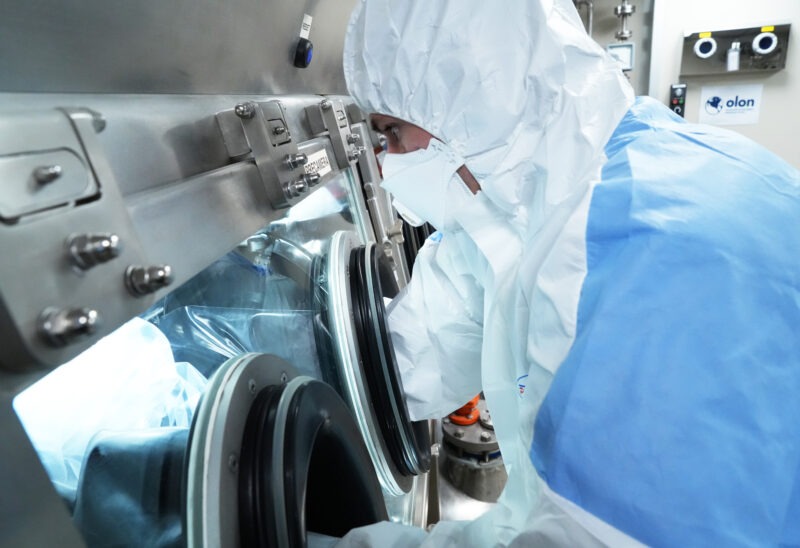Global Scenario: Opportunities and Challenges in Peptides
Sponsored by Olon
In just the last five years, the US Food and Drug Administration (FDA) has approved no fewer than 14 peptides with therapeutic activities. Today, there are around 70 therapeutic peptides under development in the pharmaceutical industry—of which an impressive 15 are in Phase III—in many of the therapeutic areas which undergo the most intensive research and development, including oncology, diabetes, and cardiovascular and auto-immune diseases.
Peptides are an extremely promising area of pharmacological research, partly because their chemical synthesis cycle offers important advantages for the industry: a short production cycle and development times and easily scalable production for short peptides. However, these benefits must be weighed against significant disadvantages: a process with an extremely high environmental impact (just consider that it takes around 6.5 tons of solvents to produce 1 kg of 30-amino-acid peptides), the use of very expensive materials and a complex impurity profile.
To provide its Partners with innovative and effective solutions, Olon is developing one of the market’s most innovative technological platforms, capable not only of overcoming these disadvantages, but also of offering extremely high-quality peptides, relying on some of the world’s most extensive expertise in the field of biomanufacturing.
We began the project by working on the design of a recombinant bacterial strain selection of a strain capable of producing high concentrations of peptides. Our technological platform is based off a fusion protein, thanks to which, we can purify the peptides in a highly efficient manner, obtaining an extremely high-quality product up to 99%.
Peptides: increased interest as therapeutic drugs
A growing number of novel therapeutic peptides are in preclinical and clinical development. The key contributor to this success is the potent, specific, and safe mode of action of peptides. The market was valued at US$ 25 billion in 2019 and is projected to reach US$ 50 billion by 2027; it is expected to grow at a compound annual growth rate (CAGR) of 9.2% from 2020 to 2027.
Beside the chemical synthetic approaches for the manufacturing of peptide-based APIs, including classic solution-phase chemistry, solid-phase synthesis, fragment condensation and other novel technologies, the interest in the biologic approach to produce peptide APIs is growing every day.
Recombinant Technology, Advantages Versus Synthetic Technology
The RECOMBINANT PRODUCTION of peptides offers several advantages in terms of cost-effectiveness, scalability, and sustainability as outlined below.
- The high success rate of large-scale production because the biotechnological process can be easily scaled up. The raw peptides obtained are about 90% pure and a single purification step can be sufficient to get a high purity product.
- It offers a high level of consistency and efficiency, also for complex peptides.
- It represents a highly green process, considering that the solvents are required only for final product’s purification. Consequently, the raw materials cost impact on overall production costs is limited, only about 5% only.
On the contrary, SYNTHETIC TECHNOLOGY utilized for therapeutic peptides implies several disadvantages as outlined below.
- It has a significative impact on sustainability and environmental impact because of the higher quantity of solvents used.
- Regarding the product quality, the risk of generation of a complex impurity profile (insertion, deletion, double-hits) is higher. As the number of amino acids form, the peptide increases, and the API purity obtained is reduced.
- Finally, the purification step of the synthesis is more complex than recombinant technology.
Olon is developing a strong know-how and skilled R&D teams for the development of rDNA peptides and proteins, applying expertise to produce easily and in a short time, the peptide target. Furthermore, recombinant peptide package provides a cost-effective approach for large-scale peptide production.
Olon’s Expertise of Recombinant Technology Applied To Peptides
The rDNA technology greatly increased the number of the industrial biotechnological applications. The microorganism is no more used for its intrinsic capacity to synthetize a product of interest, but it represents a microbial cell factory that it is used to produce heterologous proteins.
This approach can open endless opportunities that can be applied to a wide range of substance categories, as human, plant, animal and many others. The rDNA technology was applied by Olon to the production of therapeutic peptides, relatively small peptides analogs of human hormones with some small modifications in the structure to improve their stability. The choice of the expression system plays a central role in the development of a recombinant
production process. So far, the production of approved therapeutic peptides is restricted to E. coli, S. cerevisiae and P. pastoris.
We have developed a specific expertise in E. coli as the host strain and host gene. This R&D strategy is based on multiple factors:
- E. coli genetics is very well known; this strain can be easily manipulated;
- It does not any particular nutritional requirements;
- it has shown a short replication time.
Using E. coli, it is possible to produce a significant quantity of recombinant proteins in a short time. Finally, consequently, the scale-up for the fermentation process is relatively simple and cost effective.
Our R&D strategy is to invest in the vector design, along the development process. Our strategic approach, even if more complex, allows us to minimize the risk of issues of instability of the recombinant peptide and simplify the product. Olon has internal expertise in scaling up peptides to a major industrial scale. We developed a production method that was optimized to meet the requirements of regulatory agencies that have set very low allowable limits.


